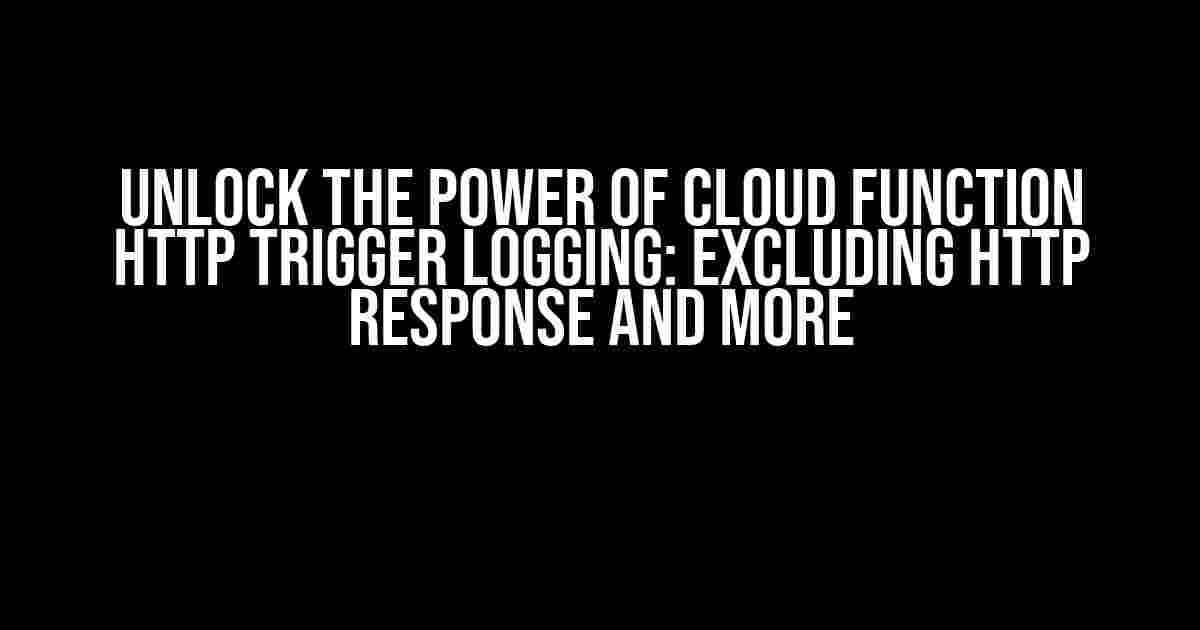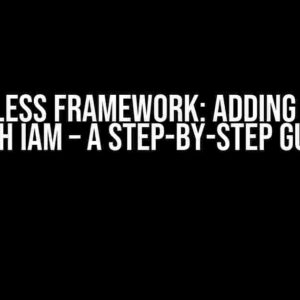As a developer, you understand the importance of logging in Cloud Functions. It’s essential to track the performance, errors, and other vital information about your functions. But did you know that you can customize your logging to exclude certain information, like HTTP responses? In this article, we’ll dive into the world of Cloud Function HTTP trigger logging, exploring how to log other essential information while excluding HTTP responses.
What is Cloud Function HTTP Trigger Logging?
Cloud Function HTTP trigger logging is a feature that allows you to track and record events related to your Cloud Functions. When you enable logging, Cloud Functions captures information about each function invocation, including the request and response data. This data is then stored in the Cloud Logging service, where you can view, analyze, and export it as needed.
Benefits of Cloud Function HTTP Trigger Logging
- Debugging and Troubleshooting: Logging helps you identify and resolve issues with your functions, making it easier to debug and troubleshoot problems.
- Performance Monitoring: Logging provides insights into your function’s performance, allowing you to optimize and improve its efficiency.
- Security and Compliance: Logging helps you meet security and compliance requirements by providing a record of all function invocations and data access.
- Cost Optimization: By monitoring function invocations and resource utilization, logging helps you optimize costs and reduce waste.
Excluding HTTP Response from Cloud Function Logging
By default, Cloud Function HTTP trigger logging includes the HTTP response in the log data. However, there may be cases where you want to exclude this information from your logs. For example, you might not want to log sensitive data or reduce the log payload size. Fortunately, you can customize your logging to exclude the HTTP response.
Using the `logHttpResponse` Property
To exclude the HTTP response from your logs, you can set the `logHttpResponse` property to `false` in your Cloud Function configuration. This property is available in the `cloudfunctions` section of your `cloudfunctions.yaml` file.
cloudfunctions:
helloWorld:
handler: helloWorld
events:
- http
logsConfig:
logHttpResponse: false
By setting `logHttpResponse` to `false`, you’re telling Cloud Functions to exclude the HTTP response from the log data. This can help reduce the log payload size and protect sensitive information.
Logging Other Essential Information
While excluding the HTTP response from your logs, you might want to log other essential information to gain better insights into your function’s behavior. Here are some examples of additional information you can log:
Logging Request and Response Headers
You can log request and response headers to gain more insights into the HTTP traffic. For example, you can log the `User-Agent` header to identify the client making the request.
cloudfunctions:
helloWorld:
handler: helloWorld
events:
- http
logsConfig:
logHttpRequestHeaders:
- User-Agent
logHttpResponseHeaders:
- Content-Type
In this example, the `logHttpRequestHeaders` and `logHttpResponseHeaders` properties allow you to specify the headers you want to log.
Logging Custom Metadata
You can log custom metadata using the `logsConfig` section. For example, you can log a custom `trackingId` to identify specific requests.
cloudfunctions:
helloWorld:
handler: helloWorld
events:
- http
logsConfig:
customMetadata:
trackingId: ${trackingId}
In this example, the `customMetadata` property allows you to log a custom `trackingId` variable.
Best Practices for Cloud Function Logging
When configuring Cloud Function logging, it’s essential to follow best practices to ensure you’re getting the most out of your logs:
- Log only what you need: Avoid logging unnecessary information to reduce log payload size and storage costs.
- Use logging levels wisely: Use different logging levels (e.g., INFO, ERROR, DEBUG) to categorize your logs and make them easier to analyze.
- Log custom metadata: Use custom metadata to log additional information that’s specific to your use case.
- Monitor and analyze logs regularly: Regularly review your logs to identify trends, errors, and performance issues.
- Use log-based alerting: Set up alerts based on log data to notify you of issues or anomalies.
Conclusion
In this article, we’ve explored the world of Cloud Function HTTP trigger logging, focusing on how to exclude HTTP responses and log other essential information. By following best practices and customizing your logging configuration, you can gain better insights into your function’s behavior, optimize performance, and meet security and compliance requirements. Remember to log only what you need, use logging levels wisely, and monitor and analyze your logs regularly.
| Logging Property | Description |
|---|---|
| logHttpResponse | Excludes the HTTP response from log data |
| logHttpRequestHeaders | Logs request headers |
| logHttpResponseHeaders | Logs response headers |
| customMetadata | Logs custom metadata |
Frequently Asked Question
Get the inside scoop on Cloud Function HTTP Trigger Logging – find out what you can and can’t log, and how to exclude HTTP responses from your logs.
Can I log any information I want with Cloud Function HTTP Trigger Logging?
Almost! You can log any information that’s available in the Cloud Function’s runtime environment, such as environment variables, request headers, and the request body. However, there are some limitations, so be sure to check the Cloud Function documentation for specific details.
How do I exclude HTTP responses from being logged with Cloud Function HTTP Trigger Logging?
You can exclude HTTP responses from being logged by setting the `log_RESPONSE` property to `false` in your Cloud Function’s configuration. This will prevent the HTTP response from being included in the log output, but other information, such as the request headers and body, will still be logged.
Can I log custom metadata with Cloud Function HTTP Trigger Logging?
Yes, you can log custom metadata with Cloud Function HTTP Trigger Logging by using the `console.log()` function and including the metadata in the log message. For example, you could log a custom ID or other identifying information about the request.
Will logging other information besides HTTP responses affect the performance of my Cloud Function?
Logging additional information can potentially impact the performance of your Cloud Function, depending on the volume of logs and the complexity of the data being logged. However, the impact is usually minimal, and the benefits of logging additional information often outweigh the performance costs.
Are there any limits to the amount of information I can log with Cloud Function HTTP Trigger Logging?
Yes, there are limits to the amount of information you can log with Cloud Function HTTP Trigger Logging. For example, there are limits to the size of individual log entries, as well as limits to the total volume of logs that can be written per day. Be sure to check the Cloud Function documentation for specific details on logging limits.



